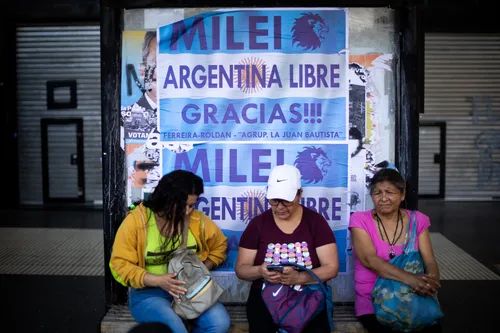
The ultraliberal adjustments implemented by Argentine president, Javier Milei, have a greater impact on women in the country. The complaint is made by activists from popular movements who feel the worsening of living conditions on a daily basis.
“There is a phenomenon of feminization of poverty”, he explains to Brazil in fact Yanina Settembrino, member of the Argentine Rural Federation. “Many women are heads of families and inflation directly impacts decision-making about the family economy,” she says.
According to official data from the Argentine government, in 2022, seven out of every 10 poor people were women. In the labor market, the salary difference between men and women was 28% less for female workers.
With Milei, the movements point to a worsening of this scenario. As soon as he assumed the presidency last year, the president announced a mega-devaluation of the Argentine peso, which caused prices to skyrocket and salaries to lose purchasing power.
The result was the highest inflation in the last 32 years: more than 211% in December and more than 254% in January in the annual index.
“The measures being taken affect not only the family economy, but also the safety and projects of any woman”, points out Laura Camelli. To the Brazil in facta civil servant from the state of Misiones and member of the Argentine Workers Union Central (CTA) says that government policies worsen “health, work, relationships, the possibilities of growth in our private lives”.
“This advance on our rights affects our ability to dream of a better future. It’s difficult to think about that when we don’t have anything to fill our pots with,” he says.
The activists still reject the Decree of Necessity and Urgency (DNU) issued by Milei, which contained a deregulatory labor reform that ended up being blocked by the courts. Furthermore, the “bus law”, a package of hundreds of measures that aim to refound the State and Argentine laws, is also pointed out by activists as an element of attack on women.
“The political discussion and also the mobilization in the streets managed to stop the law that they tried to discuss in Congress, which was an unconstitutional law, it was a constitutional reform disguised as a law. They are determined to end our country and we are determined to defend it “, said Yanina.
Right to abortion threatened
In addition to the exchange rate devaluation, the president moves to privatize public companies, close social assistance centers, and remove labor and social rights won by Argentines.
One of them is the right to voluntary termination of pregnancy, approved in 2020 after years of struggle and campaigning by feminist movements. In February, representatives from the government base presented a bill to try to revoke the right to abortion and criminalize health professionals who perform it.
However, activists believe that the government may want to act immediately to restrict this right rather than wait for the lengthy process in the Legislature.
“The strategy that they can perhaps use is to seek legal means to make access to pregnancy termination difficult”, says Yanina Settembrino. “In fact, they say they are liberal, but they are not liberal when we say that it is women’s right to decide about their own bodies. And there is nothing more liberal than each person being able to decide about their own body”, she says.
Laura Camelli warns of the increase in women’s social vulnerability due to Milei’s stance. “The psychological characteristics of our president are very worrying for the female gender. All the measures he is taking are aimed at placing us at a level of insecurity and greater vulnerability,” she says.
This scenario took women to the streets. During the general strike on January 24th, the biggest mobilization against the Milei government so far, there was massive female participation and, in the coming months, the movements promise more acts.
“Our feminist struggle has been going on for years”, points out Gloria del Carmen, who belongs to the Evita Movement. “Although we have many achievements, we know that we have great battles, even more so with this government. Now it’s time to go out and fight, be on the streets and resist,” she says.
Editing: Rodrigo Durão Coelho
Source: www.brasildefato.com.br

